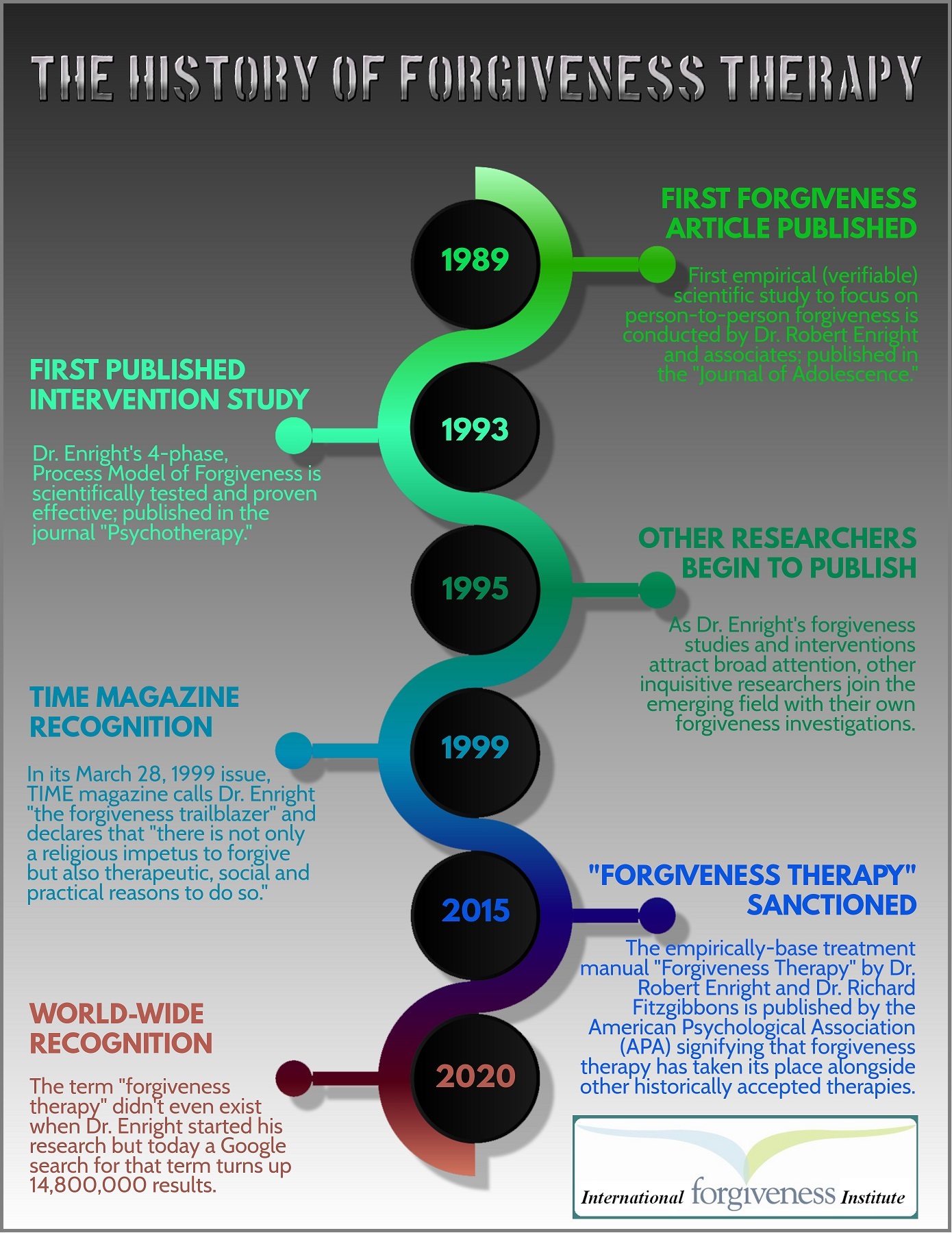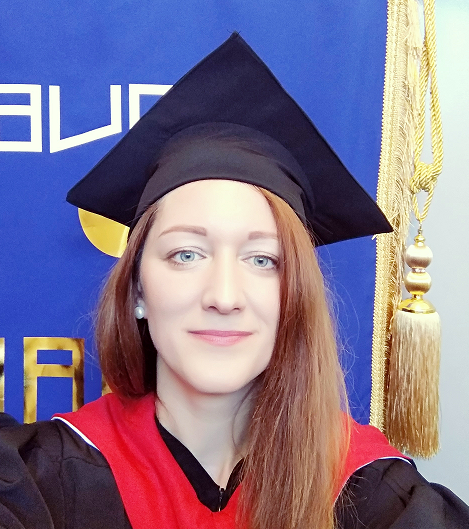IFI News
Forgiveness Therapy Proposed as Antidote for Traumatic Childhood Experiences
Forgiveness Therapy and forgiveness interventions developed by Dr. Robert Enright are being embraced in a just-released study as promising tools for effectively dealing with what the study calls a “major public health crisis.”
Researchers at the Laureate Institute for Brain Research (Tulsa, OK) have teamed up with those at Stanford University (Stanford, CA) to study the life-long adverse impacts of Early Life Adversity (ELA). The study is titled “Is There an Ace Up Our Sleeve? A Review of Interventions and Strategies for Addressing Behavioral and Neurobiological Effects of Adverse Childhood Experiences in Youth.” It was published just five days ago, March 13, 2020, in the empirical journal Adversity and Resilience Science.
ELA is the term for the negative experiences children may face or witness while growing up (sometimes also called Adverse Childhood Experiences—ACEs). These traumatic experiences include:
- emotional, physical, or sexual abuse;
- emotional or physical neglect;
- living in a household in which domestic violence occurs;
- growing up in household dealing with substance abuse or mental health problems;
- instability due to parental separation, divorce or incarceration;
- witnessing violence in the home; or,
- having a family member attempt suicide.
Any of those traumatic experiences can lead to what child development specialists call “toxic stress” if encountered by children without adequate adult support. Toxic stress can disrupt early brain development and compromise functioning of the nervous and immune systems. The more adverse experiences in childhood, the greater the likelihood of developmental delays and other problems that can cause life-long complications.
In fact, psychologists say, adults with more adverse experiences in early childhood are also more likely to have health problems including alcoholism, depression, heart disease, diabetes and other chronic diseases as well as impaired cognitive and social development. The report suggests that many adult diseases are, in fact, developmental disorders that begin early in life.
The new ELA publication describes and evaluates existing evidence-based interventions and their outcomes including Forgiveness Therapy. Three of Dr. Enright’s peer-reviewed empirical studies were examined and cited for achieving commendable outcomes compared to those of a control group:
- Female incest survivors (Freedman & Enright, 1996). Results: “significantly greater decrease in levels of depression and anxiety.”
- Women diagnosed with fibromyalgia who had experienced at least two ACEs in their childhood (Lee & Enright, 2014). Results: “increases in forgiveness toward their abuser, lower levels of state anger, and improvements in physical health related to their fibromyalgia symptoms.”
- Female Pakistani adolescents with histories of abuse (Rahman, Iftikhar, Kim & Enright, 2018). Results: Similar findings to the fibromyalgia study “suggesting that Forgiveness Therapy may uphold in a cross-cultural context.”
Those three intervention experiments by Dr. Enright and his research partners are the only Forgiveness Therapy examples cited in the 24-page ELA study that “have shown forgiveness therapy to be effective” in both physically and emotionally healthy ways. The ELA study also postulates that those interventions are effective because in Dr. Enright’s approach “the hypothesized mechanism behind forgiveness therapy involves cognitive restructuring of the abuser and events.”
Based on the evidence gather through this new ELA study, Forgiveness Therapy is one of the promising interventions for children who are experiencing toxic stress without appropriate support from parents or other concerned caregivers. That, they conclude, can help return a child’s stress response system back to normal while reducing negative mental and physical health outcomes later in life.
“Therefore, we conclude that they (Forgiveness Therapy interventions) are well-suited for and hold promise to exert immediate preventive and sustained changes in outcomes for maltreated youth.” – ELA study conclusion, March 13, 2020.
Why is this subject important? Why does it matter?
According to the World Health Organization, as many as 39% of children worldwide are estimated to experience one or more forms of early life adversity, placing a high economic burden on health-care systems—and society in general—through medical costs and lost productivity.
The mission of the Laureate Institute for Brain Research (LIBR) is to “develop novel therapeutics, cures and preventions to improve the well-being of persons who suffer from or are at risk for neuropsychiatric illness.” Dr. Namik Kirlic, the LIBR Principal Investigator for the ELA study, is a clinical psychologist who has devoted his professional life to studying ELA interventions and how to optimize their positive outcomes. Other team members for the ELA study include Zsofia Cohen (Dr. Kirlic’s Research Assistant) and Dr. Manpreet Singh, a psychiatrist and medical doctor at Stanford Health Care.
MORE INFORMATION:
- Read the full, 24-page ELA study on Adverse Childhood Experiences.
- Learn more about Adverse Childhood Experiences on the Psychology Today website.
- Find out how toxic stress can have damaging effects on learning, behavior, and health across the lifespan at the Harvard University Center on the Developing Child.
- Read about Early Childhood Development on the U.S. Department of Health & Human Services Office of Early Childhood Development website.
Forgiveness: “Groundbreaking Scientific Discovery”
A cutting-edge organization in California that sponsors groundbreaking scientific discoveries has launched a new service called Greater Good in Action and added forgiveness to its list of practices that can help you improve your social or emotional well-being or the well-being of others including your children.
 The Greater Good Science Center (GGSC) at the University of California, Berkeley, not only studies the psychology, sociology, and neuroscience of well-being but also “teaches skills that foster a happier life and a more compassionate society–the science of a meaningful life.”
The Greater Good Science Center (GGSC) at the University of California, Berkeley, not only studies the psychology, sociology, and neuroscience of well-being but also “teaches skills that foster a happier life and a more compassionate society–the science of a meaningful life.”
The Greater Good in Action initiative adds forgiveness to its list of established practices that include compassion, generosity, gratitude, honesty and others. It is a new addition to a service the organization began in July of 2017, called Raising Caring, Courageous Kids that is designed to help parents raise kids of high character who treat others with compassion and respect.
In its inaugural forgiveness practice called Introducing Kids to Forgiveness, Greater Good in Action cites the pioneering forgiveness work of psychologist Robert Enright, Ph.D., and psychiatrist Richard Fitzgibbons, M.D. (co-authors of Forgiveness Therapy, a manual providing instructions for clinicians who want to incorporate forgiveness interventions into their therapy with clients.
Referencing Dr. Enright’s years of hands-on experience teaching children about forgiveness (he has developed 17 Forgiveness Curriculum Guides for kids in pre-school through 12th grade that are being used in more than 30 countries around the world), Greater Good in Action links readers to a separate dissertation on Dr. Enright’s insights into how to help children and adolescents learn and practice forgiveness.
That work concludes that “a wide range of studies have found that forgiveness programs can help kids of different ages feel better, strengthen their relationships, and improve their academic performance.”
Because conflict is inevitable, teaching children about forgiveness early on
may indeed be a path toward building communities
of people who prize and cultivate peace.
Maryam Abdullah, Ph.D., Parenting Program Director at Greater Good
and a developmental psychologist with expertise in parent-child relationships.
The practices provided by Greater Good in Action are for anyone who wants to improve his or her social and emotional well-being, or the well-being of others, but doesn’t necessarily have the time or money to invest in a formal program. Through its free online magazine Greater Good, the GGSC provides articles, videos, exercises, quizzes, podcasts, workshops and more for parents and families to help them foster positive attributes like forgiveness in themselves and their children.
How Forgiving Are You?
When someone does you wrong, are you more likely to turn the other cheek or slash their tires? Take the Greater Good Forgiveness Quiz to find out.
The History of Forgiveness Therapy
The prominence of forgiveness and forgiveness therapy in the field of psychology over the past few decades has been well-documented in the scientific literature. Also well documented has been the pioneering and groundbreaking forgiveness work of Dr. Robert Enright within that movement. Here are pertinent milestones:
Forgiveness Spotlight: Dr. Jichan J. Kim
Editor's Note: This is the first in a series of articles that will focus on former students of Dr. Robert Enright who have continued their forgiveness research activities after graduation and who have made their own mark on the forgiveness movement.
Dr. Jichan J. Kim is a South Korean native who studied under Dr. Enright for four years at the University of Wisconsin-Madison where he earned both his Masters and Ph.D. degrees in Educational Psychology while at the same time pursuing research projects that led Dr. Enright to call him “one of the most prolific graduate assistants I’ve ever instructed.”

Dr. Jichan J. Kim
During those four years, the two researchers worked together to conduct numerous forgiveness-related research projects including a study that explored how graduate-level theology students in South Korea perceived the difference between divine forgiveness and human forgiveness. The results of that project were published just last month in the Journal of Spirituality in Mental Health.
After graduation, Dr. Kim left UW-Madison to become Assistant Professor of Psychology at Liberty University in Lynchburg, VA–a world-class Christian university founded by Dr. Jerry Falwell who gained international fame as an advisor to world leaders and who was named one of the 25 Most Influential People in America by U.S. News & World Report in 1983. Liberty University is one of the largest Christian universities in the world with more than 15,000 students attending classes on campus and more than 94,000 students taking courses through Liberty University Online.
At Liberty University, Dr. Kim teaches Introduction to Research, Directed Research, and Psychology and Christianity. In Spring 2020, he is teaching a
semester-long, special topics course in forgiveness,
for which he is very excited. He is also leading a Psychology Study Abroad Trip to South Korea in June 2020 where students will learn about: 1) the aspects of a collectivistic culture in contrast to an American individualistic culture; and, 2) how that culture views forgiveness and reconciliation.
The full course load complements Dr. Kim’s research activities. Since leaving UW-Madison three years ago, Dr. Kim has become even more intricately involved in forgiveness research and forgiveness education both in the US and in his home country of South Korea. His research and studies, for example, have:
- Examined the relationship between forgiveness and compassionate love;
- Explored the idea of the school as the Just and Merciful Community;
- Validated the Enright Self-Forgiveness Inventory;
- Examined subjective reasons why individuals forgive;
- Evaluated, together with his undergraduate research team at Liberty University, the effectiveness of a family-based forgiveness program with more than a dozen volunteer families; and,
- Explored the relationship between interpersonal, self-, and divine forgiveness.
“I give special thanks to Dr. Enright for introducing to me the beauty of forgiveness. I owe him a great deal and I will try my best to follow in his footsteps through a life dedicated to driving out hatred through forgiving love.”
Dr. Jichan J. Kim
 In addition to his UW-Madison degrees, Dr. Kim has received degrees from Harvard University (Cambridge, MA), Gordon-Conwell Theological Seminary (South Hamilton, MA), and City College of New York. He also has extensive ministry experience in Madison, New York City, and Boston (serving various age groups in Korean immigrant congregations).
In addition to his UW-Madison degrees, Dr. Kim has received degrees from Harvard University (Cambridge, MA), Gordon-Conwell Theological Seminary (South Hamilton, MA), and City College of New York. He also has extensive ministry experience in Madison, New York City, and Boston (serving various age groups in Korean immigrant congregations).
Dr. Kim and his wife, Jieun, have three children–Yewon (Arianna), Juwon (Aiden), and Sungwon (Joseph). For the past several years, Dr. Kim has financially supported the International Forgiveness Institute with an automatic monthly donation through PayPal. He says he has two favorite quotes he tries to live by:
- Love never fails. (1 Corinthians 13:8)
- Forgiveness is offering love to a person in the face of injustice and at a time when that person is most unlovable. (Dr. Robert Enright)
Read more:
- Dr. Kim’s biography on the Liberty University website.
- Dr. Kim’s Ph.D. Dissertation on the effectiveness of anti-bullying programs.
- Abstracts of all Dr. Kim’s Forgiveness Research Studies.
- Inoculating Children Against Violence through Forgiveness Education – a Poster Presentation jointly developed by Dr. Kim and Dr. Enright.
Forgiveness Infiltrates Central Asia’s Kyrgyzstan

Alyona Yartseva is spearheading forgiveness interventions in the former Soviet republic of Kyrgyzstan.
Alyona Yartseva moved in 2015 from Russia to Kyrgyzstan (officially the Kyrgyz Republic)–a mountainous country of incredible natural beauty in Central Asia. As she pursued her new life there, intent on helping others improve their own lives, she quickly came to realize that forgiveness is a valuable commodity not only for helping people overcome personal difficulties but also for helping tame the ethnic, political, and socio-economic tensions that simmered there and in surrounding countries that had all gained their independence with the fall of the Soviet Union in 1991.
Since Alyona moved to Kyrgyzstan, she has been on “a forgiveness rampage” that has included:
- Undertaking a 15-lesson online Forgiveness Therapy course administered by the International Forgiveness Institute (IFI) after convincing AUCA administrators to accept it as a fully-accredited graduate degree university course;
- Acquiring the Enright Forgiveness Inventory for Children (EFI-C), translating it into Russian, back-translating it, and working directly with Dr. Robert Enright, co-founder of the IFI, in modifying that research tool into what is essentially a new EFI Short Form known as the EFI-30;
- Validating the newly-adapted EFI-30 by using it, along with a checklist of physical health symptoms (a new measuring tool that she created herself), in a forgiveness research project with more than 150 participants;
- Participating in a four-month forgiveness intervention internship and conducting post-therapy interviews that “vividly demonstrated” to her the therapeutic effects and positive results of forgiveness;
- Conducting a hands-on forgiveness training program for her fellow-AUCA students to demonstrate the four-phases of Dr. Enright’s Process Model of Forgiveness and further expand the use of the EFI-30;
- Consulting with “no-charge clients” (as a student she cannot charge for her services) who were able to move towards forgiveness and improve their mental health;
- Obtaining and starting to translate into Russian Dr. Enright’s Anti-Bullying Forgiveness Program; and,
- Writing her thesis on “Subjective Effects of Forgiveness on Stress Level and Physical Health”–a project she conducted involving 150 adults of 3 nationalities and obtaining a Master of Arts Degree in Applied Psychology from the American University of Central Asia (AUCA).
One of the motivating factors for Alyona’s impressive foray into forgiveness activities was what she was unable to find when she was accepted as a graduate student at the AUCA in the capital city of Bishkek. Although she conducted exhaustive literature searches for anything related to forgiveness written in either the Russian or Kyrgyz language, she found absolutely none.
“As a believer in Jesus Christ, I’ve always understood the value of forgiveness but now I see it from a different professional perspective,” Alyona says. “I want to be able to demonstrate the effects of forgiveness (or unforgiveness) to my colleagues in Russian language publications.”
As Alyona looks ahead to the future, she says that once she completes translating the anti-bullying material she would like to personally introduce it to local school counselors. Following that, she plans to move to Uzbekistan where she wants to popularize forgiveness therapy among local psychologists. She plans to continue her forgiveness research together with a group of colleagues “who have a heart for forgiveness” and is pursuing foundation grants to fund their efforts.
“Dr. Enright’s Forgiveness Therapy is at the very top of my tool box as a counselor,” Alyona adds, “and I believe it is essential to promote and research forgiveness therapy and the positive effects of forgiveness in Central Asia.”
Alyona can be reached at: alyona.yartseva@gmail.com
Kyrgyzstan is a country in Central Asia–a region which stretches from the Caspian Sea in the west to China in the east, and from Afghanistan and Iran in the south to Russia in the north. The region consists of the former Soviet republics of Kazakhstan, Kyrgyzstan, Tajikistan, Turkmenistan, and Uzbekistan. The United Nations also includes Afghanistan as part of Central Asia. The region is also colloquially referred to as “the stans” as the countries generally considered to be within the region all have names ending with the Persian suffix “-stan,” meaning “land of.” ƒ



